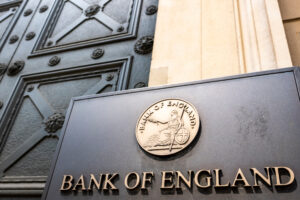
Interest rates will rise tomorrow for the fifth time in a row to 1.25 per cent amid calls for Boris Johnson to level with the public about the cost of living crisis.
The Bank of England is expected to increase rates by 0.25 percentage points from what was already a 13-year high as it seeks to rein in inflation. The Federal Reserve, America’s central bank, went further yesterday, increasing interest rates by 0.75 percentage points, the sharpest rise since 1994.
The prime minister has attempted to strike an optimistic note, saying recently that Britain is in a much better position to deal with inflation than it was in the past.
Lord King of Lothbury, a former governor of the Bank of England, said that the cost of living crisis would be “reminiscent of the 1970s” and suggested the prime minister should make clear that living standards would fall.
“Our leaders need to give us a clear narrative explaining why recent events will inevitably lower our national standard of living, how that burden will be shared, why it is important to bring inflation down, and why measures to raise economic growth and reduce regional disparities will take many years to come to fruition but will work only if we make a start now,” he wrote in The Spectator. He suggested that the Bank should have moved faster to raise interest rates given that inflation had reached a 40-year high of 9 per cent.
King said: “The governor’s eyebrows remain part of the Bank of England’s armoury. Since I left in 2013 mine have been resting. But the latest inflation rate of 9 per cent led them to rise sharply. Time to have a word with those members of the Monetary Policy Committee who only last year were keen on negative interest rates.
“As in the US, inflation is spreading beyond the energy and food sectors to most of the economy. An extremely tight labour market and a surge in industrial disputes are pushing up wages. The Bank will surely act to prevent a continuation of high inflation.”
The Bank of England has faced criticism for not doing more to rein in inflation. Charles Goodhart, a former member of the Monetary Policy Committee, said this week that it should increase rates by half a percentage point. He said before yesterday’s rise: “The Bank is already at risk of losing credibility. It will have to raise official interest rates by 50 basis points this time. Anything less would now risk its credibility and anything more might unhinge markets since it was not foreshadowed.”
Food prices are expected to rise by as much as 15 per cent this summer and autumn, putting an even greater burden on household budgets, according to new analysis by the Institute of Grocery Distribution (IGD).
Rising grocery prices will increase a typical family of four’s monthly food shopping bill from £396 per month to £439 a month, meaning they will need to find an extra £43 a month or £516 over the year at a time when the cost of filling up a car and heating homes is also rising by hundreds of pounds.
Grocery price inflation is already running at about 6.7 per cent as fuel prices and raw ingredient costs have surged on the back of the conflict in Ukraine. Analysis by the institute anticipates that annual consumer price inflation will be between 10 and 12 per cent this year, with a peak of 15 per cent over summer and autumn.
This is even higher than recent warnings from Archie Norman, chairman of Marks & Spencer, who predicted that food inflation could reach as high as 10 per cent. Andrew Bailey, the governor of the Bank of England, said last month that Britons were facing “apocalyptic” food price increases.
Traditional British cuisine, which uses a lot of cereals and meat produce, will be more vulnerable to cost pressures, with experts at IGD estimating the cost of a roast chicken dinner rising by 17 per cent by the end of this year.
The institute said food inflation could be even higher than 15 per cent if there was further speculation in food commodities; uncontrollable wage inflation; unfavourable weather that affected harvests; or if more agricultural nations introduced export bans.
The prime minister is planning a speech on the economy in a fortnight’s time with Rishi Sunak, the chancellor. The pair are said to have struggled to come up with measures to put forward, given that Sunak announced a £21 billion cost of living package last month.
The prime minister is under pressure from his cabinet to bring forward income tax cuts. He is said to favour cancelling plans to raise corporation tax from 19 per cent to 25 per cent.
It was reported last night that Sunak would save taxpayers up to £57 billion over the next three years if he stopped the Bank of England paying interest on the nearly £1 trillion it holds for commercial banks. The New Economics Foundation think tank recommended the move, the Financial Times said.
Read more:
Interest rates set to hit 1.25% as Bank tries to curb inflation






